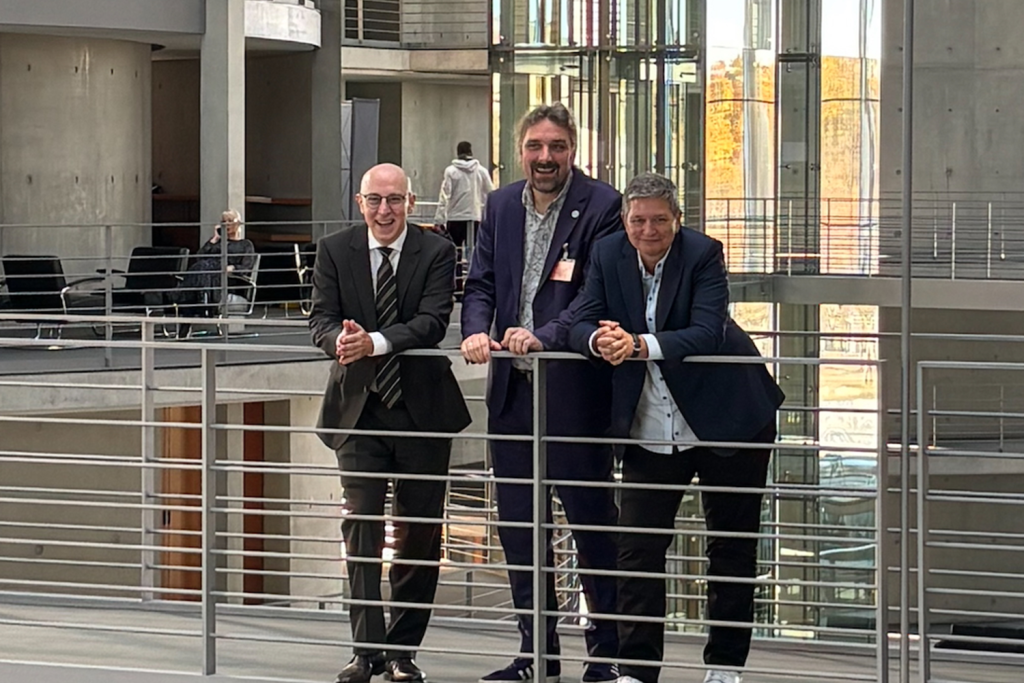Prof. Dr. Christian Hummert in the Bundestag: Research security as a structural task of science and politics

In the public expert discussion of the Bundestag Committee on Research, Technology, Space and Technology Assessment on November 5, 2025, Prof. Dr. Christian Hummert, Research Director of the Agentur für Innovation in der Cybersicherheit GmbH (Cyberagentur), called for binding requirements and new structures to make research in Germany more secure. His statement names six concrete measures, from binding (cyber) security standards to the reform of scientific incentive systems.
According to Prof. Dr. Christian Hummert, the German science system is facing new security policy challenges. Research institutions are increasingly the aim of espionage and knowledge leakage, while the strategic importance of security-relevant innovations is growing. The aim of his statement is to “systematically strengthen research security at German universities and research institutions and thus also contribute to strengthening Germany as a science location for security-relevant research.”
One of Hummert’s key concerns is that government funding will only be awarded in future if minimum standards for research safety are met. He explained that this is a process. In the initial phase, the measures taken to ensure research safety could be reviewed. At the same time, programs to increase research safety should be set up so that the institutions can improve in this area. Once this has been achieved, a binding minimum level for funding in critical areas of technology should be introduced.
As a second measure, Hummert proposes an independent national committee for research security, which would jointly advise science and security authorities and define standards. This body should also maintain a “breathing technology list” that regularly determines which research content is to be classified as security-relevant.
In addition, Hummert suggests a list of foreign cooperation partners that identifies potential safety risks and is updated regularly. At an institutional level, he recommends the establishment of research safety committees at universities and research institutions, which – similar to ethics committees – take on advisory and review tasks.
Finally, he warns that research security can only succeed if the scientific reputation system is also revised. “As long as scientific success is measured by publications in particular – ‘publish or perish’ – research security cannot be implemented effectively.”
With these six proposals, the Cyberagentur calls for research security to be seen as a cornerstone of scientific excellence – not as a limitation, but as a prerequisite for responsible innovation.
The Committee on Research, Technology, Space and Technology Assessment of the German Bundestag is concerned with shaping the framework conditions for science and research in Germany. It advises on topics such as artificial intelligence, quantum technology and supercomputing and ensures that scientific findings are linked to political decisions.
Prof. Dr. Katja Becker, German Research Foundation (Bonn); Prof. Dr. Christian Hummert, Agentur für Innovation in der Cybersicherheit GmbH (Halle/Saale); Prof. Dr. Wolfgang Liebert, Institute for Security and Risk Sciences (ISRW), BOKU University Vienna; Claudia Plattner, Federal Office for Information Security (BSI, Bonn); and Sinan Selen, Federal Office for the Protection of the Constitution (Cologne) took part in the expert discussion on research security.
Further information and registration:
https://www.bundestag.de/dokumente/textarchiv/2025/kw45-pa-forschung-1117822
https://www.bundestag.de/resource/blob/1119078/21-18-24a.pdf
